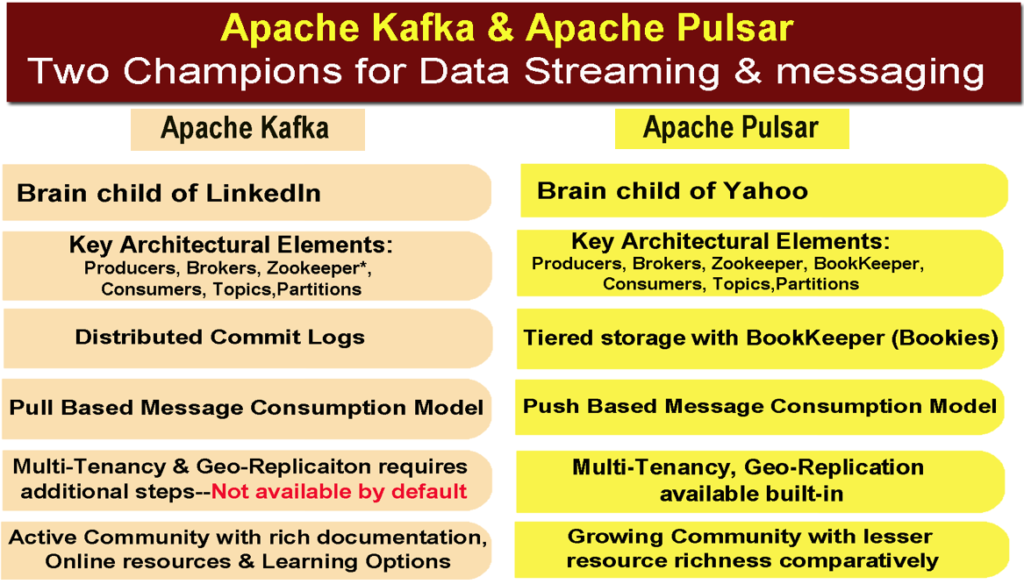Event Streaming and messaging platforms play a key role in integration projects. This includes a plenty of use-cases including EDA (Event Driven Architecture), Microservices Architecture, IoT (Internet of Things) as well as message queueing and message publishing use-cases. Apache Kafka and Apache Pulsar are among the major players in the world of Event Streaming and Messaging. In this Kafka Vs Pulsar article, we will discuss a popular question: What’s the Difference between Apache Kafka and Pulsar?
Read more: Kafka Vs Pulsar: Difference between Apache Kafka and Pulsar?What is Apache Kafka? An Introduction of Kafka
Apache Kafka is a popular, widely used open-source event streaming platform. Originally it was developed by LinkedIn and then it was open-sourced later. Kafka is distributed in nature and it is a high throughput, low latency messaging platform. Apache Kafka fits in a variety of use-cases where streaming and messaging is required.
As explained in detail in Apache Kafka Introduction article, it is a distributed system by nature. Apache Kafka consists of various components including Kafka broker, zookeeper, topics, partitions. Message producers send messages to specific topics. Topics are partitioned further. These partitions can reside in multiple brokers in a Kafka cluster. Messages are written to a commit log with offsetting mechanism.
What is Apache Pulsar? An Introduction of Pulsar
Apache Pulsar is an open-source, cloud-native messaging and event streaming platform. It was originally developed by Yahoo and later open-sourced to Apache. Apache pulsar combines several great features of traditional messaging systems like RabbitMQ and streaming features of platforms like Apache Kafka.
Apache Pulsar is considered to be highly scalable, distributed, fault-tolerant and efficient messaging and streaming platform. A certain features make it prominent against its competitors including multi-tenancy, geo-replication and tiered storage mechanism.
Kafka Vs Pulsar: What’s the Difference Between Apache Kafka and Apache Pulsar?
Now that we have already discussed the basic introduction of Apache Kafka and Apache Pulsar, let’s dive deeper into the comparison of these two messaging and streaming technologies.
Kafka Vs Pulsar: Major Differences Between Apache Kafka and Apache Pulsar

- Inception: Kafka was originally developed by LinkedIn while Pulsar has its origin rooted to Yahoo. Both platforms were originally meant for specific use-cases of their respective originating companies. However, both became open-source later.
- Architectural Components: In terms of architecture, there are certain similarities and a few key differences between Apache Kafka and Apache Pulsar. Both tools work by brokerage model with topic based subscription mechanism. The concepts of producers and consumers remain similar for both. Additionally, role of a Zookeeper plays a pivotal role in both cases to manage brokers cluster and maintaining meta data. However, it is worth mentioning here that Zookeeper is going to die from Kafka in future releases (4.0 onwards). Kafka will use KRaft protocol to remove dependency on Zookeeper. On the other hand, Zookeeper will remain a key part of the Pulsar architecture.
- Data Storage: In terms of data storage, mechanism used by Kafka and Pulsar greatly differ. Pulsar uses a distributed tiered storage mechanism by segmenting the data. BookKeeper with bookies is a component responsible for such distributed tiered storage. On the other hand, Kafka uses commit logs for data storage. These commit logs can be distributed across brokers cluster though.
- Message Consumption Model: Kafka and Pulsar have difference in terms of message consumption model followed by the consumers. In case of Kafka, pull mechanism is used. Kafka consumers poll for new messages and hence messages are pulled once polled. On the other hand, Apache Pulsar uses Push mechanism for messages. In this consumption model, messages are actively pushed towards the consumers based on the topic subscriptions.
- Replication: Data replication across multiple global locations is a great feature available in Pulsar. With geo-replication available by default; data gets replicated in multiple locations scattered geographically. On the other hand, such geo-replication is not by default available in case of Apache Kafka. Additional configurations and management steps are needed to achieve such replication in Kafka.
- Multi-Tenancy: Apache Pulsar is a truly Multi-Tenant messaging & streaming platform. Multi-tenancy is an architecture in which a single instance of a software application serves multiple customers. Each customer is called a tenant. Namespaces and access control mechanism helps achieving such features in Pulsar. Contrary to this, Apache Kafka doesn’t have such a robust built-in features for multi-tenancy & requires additional considerations to achieve it.
- Community, Documentation, Support: Kafka being an old guy enjoys better community presence compared to Pulsar. The level of documentation, public forums, supporting content is much more available for Kafka compared to Pulsar. Pre-built connectors are available for both tools to achieve different types of integrations but in this race also, Kafka has an edge.
In the video above from TutorialsPedia YouTube Channel, Kafka Vs Pulsar key differences have been further elaborated.
